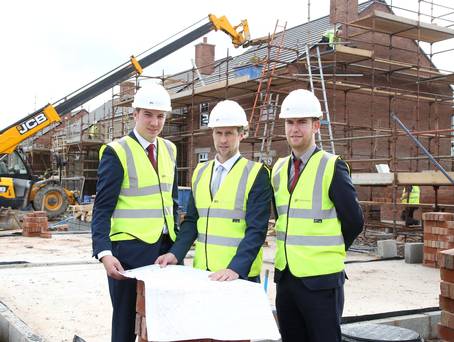It was a company immersed in tradition, indelibly linked with the Co Antrim town of Ballymena where it was founded nearly a century earlier. The £60m collapse of Patton Construction three years ago next month, due to cash-flow pressures and the impact of the sector’s downturn, was deeply traumatic for the 300 employees who lost their jobs.
But there were also massive losses for huge numbers of sub-contractors owed around £15m after the family-run company went under.
Three years on, the pain goes on for many of those involved — but PG Contracts in Loughguile, owned by ex-Patton personnel, is going some way towards reversing that dismal legacy.
The firm’s contracts director David Moneypenny (28), managing director Peter Gillan (36) and finance director Aidan Gillan (29) (who aren’t related), have been able to use former Patton ‘subbies’ in their growing workload.
At peak capacity, PG Contractss, which was set up initially by Peter, has been using up to 150 sub-contractors at a time on its jobs.
Buildings are a passion for David, and as he sits down in a Royal Avenue cafe for our interview, he enthuses that he worked on the fit-out of the Tesco Express next door, and on the early stages of the massive Ulster University build on York Street, with Patton Construction.
Growth has been impressive, and David says the company has jumped from a turnover of £0.9m in 2013 to around £6m projected turnover for 2015/16.
It’s been working on jobs such as fit-outs of luxury apartments in London’s Chancery Lane — with penthouses costing around £2m — to housing developments of around 32 units at home, and even working on the construction of two or three £1m standalone dwellings on Co Antrim’s north coast — a badge of wealth we haven’t seen much of recently.
They’ve even worked on ITV soap Coronation Street, installing fitted furniture including vanity units and mirrors in the cast’s changing rooms at studios in Media City, Salford.
But building that client base was hard work, David says: “In January 2013, Peter and I sat down with an A3 sheet and there wasn’t a single piece of work on it. So we brainstormed all the contractors and lines of business we could chase.”
PG Contracts is also carrying out work for Belfast City Council at Woodlands Park Pavilion and apartments in Lisburn, on a site which has been dormant for years. Another big project was work on demolition and building of a new restaurant, Harbour & Company, in Donaghadee, a 12 week programme worth £0.75m.
They are also carrying out work for Co Londonderry contractor, EHA Group, which has an office in Bishops Stortford in Hertfordshire.
PG Contracts works both as a sub-contractor, for heavy-hitters such as McLaughlin & Harvey, H&J Martin (now part of Lagan) and as the main contractor for ‘end users’.
The Co-op has also turned into a major client, with PG working on its refresh and fit-outs in Glengormley, Lisburn and other locations here, as well as places like Minster, Margate and West Horwood in England.
And such is the demand for their services in Great Britain, that they are renting a six bedroomed house for themselves and their tradesmen to use in central London for a ‘scary’ rent.
Peter and David split the company’s usual number of 20 projects between them.
There is no tradition of business in David’s immediate family — he has a brother and sister, his father is retired and his mum a childminder — but there was one lesson.
“We were brought up to believe that it doesn’t matter what you achieve so long as you try your hardest,” he said.
He went to school in Hillsborough and Dromore before a construction-related course in Lisburn and degree in Jordanstown.
“I suppose I was always ambitious to achieve,” he said.
He just got married in August to Jenna, a pharmacist.
The attitude to business which he shares with Peter and Aidan is: “It’s about being sensible and being modest, and that’s the way we have worked for the past three years. We have a good attitude and we work hard — the three of us work incredibly hard.
“We are self-funded. Of course, we have support from the bank if we need it but we are 100% self-funded. We don’t have that attitude of taking out everything from the business that we can, but instead we put everything we can make back in.
“We are here for the long-run and longevity is extremely important to us.
“We take a modest wage and everything is going back into the business. “We have invested heavily in plant machinery — it’s almost been spend, spend, spend on things like scaffolding, diggers, forklift trucks and power tools.”
But three years ago, the outlook was less positive following Patton’s collapse.
David had been employed by the firm as a site manager while Peter was a major sub-contractor.
David’s years in Patton were a formative experience, and he had a year out from Jordanstown working for the firm.
He didn’t let the catastrophic state of the industry when he emerged from college in 2009 put him off and was determined to work with Patton because of its great reputation in construction — even though the tough-times and lay-offs for the company had already begun.
“When I started out the industry was really busy but by the time I came out it was grim. Very grim.
“So many of the people I went to university with just left straight away and went to Australia and New Zealand for work, and a couple went to America.”
And with an understatement belying his steely determination, David says: “I was happy enough to stay though it wasn’t really a conscious decision or that I wasn’t prepared to travel.
“I took the summer off then went to work for D-Mac Construction in Cookstown and was happy with that.
“At that stage, Pattons was working on the new Audi garage in the Titanic Quarter and I was engaged by D-Mac Contracts in Lisburn to give them a hand on site. When I was there I approached Neil Patton and asked him for work.
“Pattons was basically one of the biggest builders here, and one of the first jobs I was on was the (University of Ulster) Arts College, which was one of the biggest jobs in Belfast.”
Signals of the state of the construction sector at the moment are mixed, he says. “I don’t think I’d say that the construction sector is in a good state though companies like ours do have a bit more confidence.”
And he says working with like-minded individuals is helping them get things done.
“Peter and I always have the same train of thought,” he said. “We are both very highly trained and motivated.”
But he still thinks about the suffering the Patton failure inflicted. “There’s a lot of people who will be feeling the pain for years,” he said.
View this article and more at the Belfast Telegraph.




